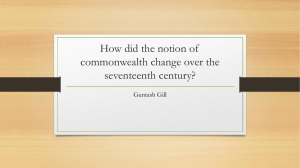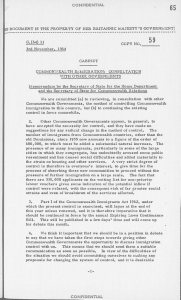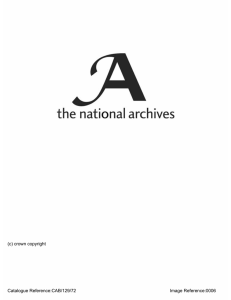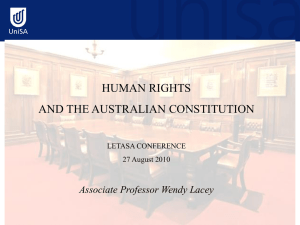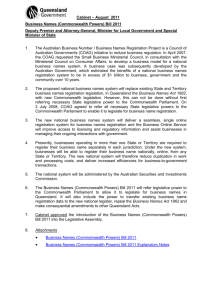TOPIC 13
advertisement
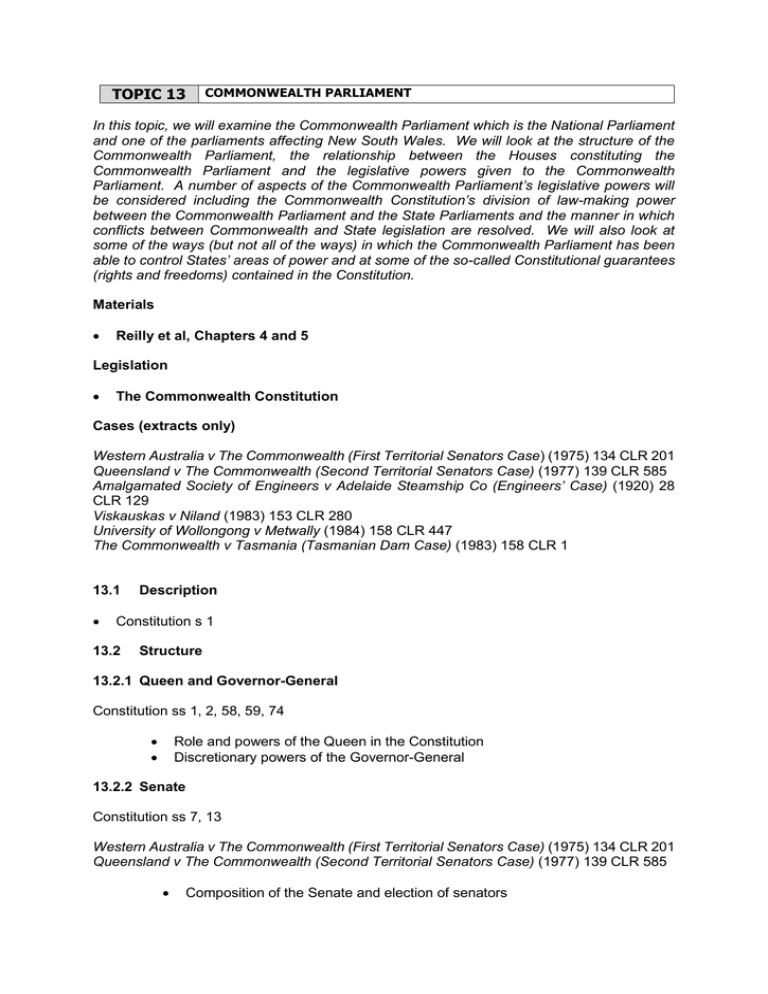
TOPIC 13 COMMONWEALTH PARLIAMENT In this topic, we will examine the Commonwealth Parliament which is the National Parliament and one of the parliaments affecting New South Wales. We will look at the structure of the Commonwealth Parliament, the relationship between the Houses constituting the Commonwealth Parliament and the legislative powers given to the Commonwealth Parliament. A number of aspects of the Commonwealth Parliament’s legislative powers will be considered including the Commonwealth Constitution’s division of law-making power between the Commonwealth Parliament and the State Parliaments and the manner in which conflicts between Commonwealth and State legislation are resolved. We will also look at some of the ways (but not all of the ways) in which the Commonwealth Parliament has been able to control States’ areas of power and at some of the so-called Constitutional guarantees (rights and freedoms) contained in the Constitution. Materials Reilly et al, Chapters 4 and 5 Legislation The Commonwealth Constitution Cases (extracts only) Western Australia v The Commonwealth (First Territorial Senators Case) (1975) 134 CLR 201 Queensland v The Commonwealth (Second Territorial Senators Case) (1977) 139 CLR 585 Amalgamated Society of Engineers v Adelaide Steamship Co (Engineers’ Case) (1920) 28 CLR 129 Viskauskas v Niland (1983) 153 CLR 280 University of Wollongong v Metwally (1984) 158 CLR 447 The Commonwealth v Tasmania (Tasmanian Dam Case) (1983) 158 CLR 1 13.1 Description Constitution s 1 13.2 Structure 13.2.1 Queen and Governor-General Constitution ss 1, 2, 58, 59, 74 Role and powers of the Queen in the Constitution Discretionary powers of the Governor-General 13.2.2 Senate Constitution ss 7, 13 Western Australia v The Commonwealth (First Territorial Senators Case) (1975) 134 CLR 201 Queensland v The Commonwealth (Second Territorial Senators Case) (1977) 139 CLR 585 Composition of the Senate and election of senators Terms of office Provision for senators to be elected from the Territories 13.2.3 House of Representatives Constitution ss 24, 27, 28 13.3 Composition of the House of Representatives and election of members The House to be as near as practicable twice the size in number as the Senate Legislative powers 13.3.1 Enumerated specific powers Constitution ss 51-60 Law-making provisions in the Constitution 13.3.2 Exclusive and concurrent powers Constitution ss 106-109 Difference between exclusive and concurrent powers Ways in which the Constitution makes powers exclusive to the Commonwealth Parliament 13.3.3 Inconsistency of Commonwealth and State legislation Constitution s 109 Viskauskas v Niland (1983) 153 CLR 280 University of Wollongong v Metwally (1984) 158 CLR 447 The function of s 109 o Confirms the legislative supremacy of the Federal Parliament over the State Parliaments with respect to concurrent powers o Eliminates conflicts of law that may arise between State and Federal laws operating in the same field o Allows the Commonwealth to determine whether it might allow State laws to operate in areas that might otherwise be the subject of Federal laws o “laws” in s 109 refer to Acts of State or Federal Parliament Tests of inconsistency applied by the High Court: o “cover the field” – A Federal law evinces an express or implied intention to provide an exhaustive statement over the relevant subject matter o direct inconsistency: where it is impossible to simultaneously obey both State and Federal law where one law takes away a right or privilege conferred by another 13.3.4 Commonwealth control of States’ areas of powers Constitution ss 51(xxix), 96, 109 Amalgamated Society of Engineers v Adelaide Steamship Co (Engineers’ Case) (1920) 28 CLR 129 Victoria v The Commonwealth (Federal Roads Case) (1926) 38 CLR 399 A-G (Vic) (ex rel Black) v The Commonwealth (DOGS Case) (1981) 146 CLR 559 The Commonwealth v Tasmania (Tasmanian Dam Case) (1983) 158 CLR 1 New South Wales v Commonwealth [2006] HCA 52 Early narrow view of Commonwealth powers in relation to States powers Effect of the Engineers’ Case Use of s 96 & s 109 in widening the scope of Commonwealth power External affairs power (s 51(xxix)) 13.3.5 Constitutional amendments Constitution s 128
